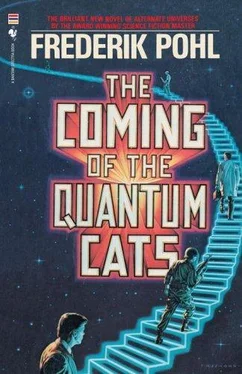Frederik Pohl - The Coming of the Quantum Cats
Здесь есть возможность читать онлайн «Frederik Pohl - The Coming of the Quantum Cats» весь текст электронной книги совершенно бесплатно (целиком полную версию без сокращений). В некоторых случаях можно слушать аудио, скачать через торрент в формате fb2 и присутствует краткое содержание. Год выпуска: 1986, ISBN: 1986, Издательство: Bantam Books, Жанр: Фантастика и фэнтези, на английском языке. Описание произведения, (предисловие) а так же отзывы посетителей доступны на портале библиотеки ЛибКат.
- Название:The Coming of the Quantum Cats
- Автор:
- Издательство:Bantam Books
- Жанр:
- Год:1986
- ISBN:9780553763393
- Рейтинг книги:5 / 5. Голосов: 1
-
Избранное:Добавить в избранное
- Отзывы:
-
Ваша оценка:
- 100
- 1
- 2
- 3
- 4
- 5
The Coming of the Quantum Cats: краткое содержание, описание и аннотация
Предлагаем к чтению аннотацию, описание, краткое содержание или предисловие (зависит от того, что написал сам автор книги «The Coming of the Quantum Cats»). Если вы не нашли необходимую информацию о книге — напишите в комментариях, мы постараемся отыскать её.
The Coming of the Quantum Cats — читать онлайн бесплатно полную книгу (весь текст) целиком
Ниже представлен текст книги, разбитый по страницам. Система сохранения места последней прочитанной страницы, позволяет с удобством читать онлайн бесплатно книгу «The Coming of the Quantum Cats», без необходимости каждый раз заново искать на чём Вы остановились. Поставьте закладку, и сможете в любой момент перейти на страницу, на которой закончили чтение.
Интервал:
Закладка:
It was a good thing for me that Peggy knew my lines better than I did. I needed all the help I could get.
There wasn't anybody to help me now.
In a wholly different way, I was up against the same shuddery, scary, exciting thing. There was another world on the other side of that blackness.
I took a deep breath. I closed my eyes. And I walked into it.
What did it feel like?
Mostly it felt like nothing at all. I've been to a couple of science fairs where they had air doors separating the rooms, currents of ascending air mixed with water vapor so it looked as though a cloud were hanging in the doorway; they project pictures or advertising messages on them, and you walk right through them. This felt like even less of a world-crossing transition than that. It was just that at one moment I was in a shooting range in the basement of a building, noisy, filled with people, lit by banks of flickering fluorescent lights .
And then I took a step, and suddenly I was at the bottom of an excavation. I stood on duckboards, in the hottest August sunlight New Mexico can produce. Scaffolding rose around me, supporting curious machines like TV cameras with round wire shields over where their lenses ought to be. A cherry picker stood idle beside one of them, with a man idly looking down at me from the cup. Scoopedout sandy walls surrounded me. A roaring truck motor was breaking my eardrums just a few feet away.
I didn't have time to study the scene. There were two soldiers standing there to grab my arms and pull me forward. "Into the truck," one of them ordered, and turned to get the next prisoner who came stumbling through. I climbed into the truck—unremarkable Army six-by-six with board seats around the sides and a soldier manning a light machine gun, pointed toward us, squatting on the cab. When all nine of us were aboard, the truck motor roared even louder; the vehicle jerked forward, and we climbed up out of the excavation onto a mesa where two Army helicopters stood by, their rotors slowly turning. "Out," ordered the guard, who had followed us into the truck, and one by one we jumped down as the truck roared away. The guard who did the talking, watching us carefully, backed away to exchange a few words with the pilot of one of the helicopters. We all looked at each other.
We were up in bare, sandy hills. I could see the barracky buildings of an actual Army base a mile or so across the mesa—the original Sandia, I supposed. Nearer there was a tractorless OD-painted trailer body, windows showing that it was some kind of an office, on the lip of the excavation. And across the excavation were two or three other trailers, but not offices: they carried generators, thudding away, and the cables went straight down to the machines at the floor of the pit.
I was gasping from the sun in a minute, and so were the rest of us, but we were all too keyed-up to worry about heatstroke. Edna Valeska tugged at my sleeve. "They had to dig to get down to basement level," she said, pointing.
"What?"
"They wanted to come out in the basement of the building," she explained, "and there wasn't any building here. So they had to dig."
"Oh, yeah." It didn't seem important. To tell the truth, I'd had too many things to react to, I didn't know what was important and what was not any more. I could see two more figures appear out of the black rectangle: Nyla-the-Sergeant, and the man who looked like, but said he wasn't, Djugashvili. They exchanged words, and Nyla turned away to get into a jeep. "What about the scaffolding?"
"At a guess," said Dr. Valeska, "that was a matter of positioning too. They wanted to bug us. To look into the laboratories. Some of them were on the top floor."
It sounded rational enough, though I was no longer sure about what constituted rationality, either. One of the juniors put his finger on the central question.
"What do you think they're going to do with us?" he asked, his voice quavering.
Nobody had a good answer for that. Colonel Martineau came closest. "I think that's what we're going to find out from the sergeant," he said, as Nyla Sambok's jeep spun sand from its wheels while she parked it behind us.
She didn't tell us, though—at least not right away. She was called, scowling, over to the colloquy between the guard and the copter pilots. "Colloquy" was too mild a word; it was becoming a straight-out argument, and they weren't keeping their voices down.
We didn't have to wonder long about the subject of the disagreement. It was like that old puzzle of the missionaries and the cannibals crossing a river. Each helicopter could hold five persons besides the pilot. There were nine of us—nine prisoners—and one guard made ten. Two loads. Only neither of the pilots was willing to take a chance with carrying five of us enemy maniac desperadoes without an armed guard.
"Aw, shit," said Sergeant Sambok at last. "Get on with it. You take four, you take four, and I'll keep the odd one here until one of you gets back." And as they grudgingly started loading us into the choppers, she spun and pointed to me. "Leave that one," she said. "I'll hold him for the next trip."
"Sure, Sarge," whined one of the guards, "but the major said—"
"Move it," ordered Nyla. And they did. When the choppers were airborne she turned to look at me analytically. I guess I didn't look like too much of a problem to deal with for a healthy woman with a carbine. She gave a short nod. "No sense frying our brains out here," she said. "Let's get inside the trailer."
The blessed thing was air-conditioned.
It was also empty. Apparently it was for the use of the helicopter people, and there weren't any of them left. She let me go in first and waited until I was well clear of the doorway before she followed. She moved into a corner and expertly flipped a couple of quarters out of her fatigue pocket to me. "There's a Coke machine over there," she said. "I'm buying. . . . Open it and put it down on the table," she added, and then added one more thing, "Please."
She sat back and took a long pull at the Coke, watching me. I did the mirror-image same. At close range, with just the two of us there in the room, she looked more like my Nyla than ever. Oh, sure, wearing some sort of getup for a Halloween party. But Nyla Christophe Bowquist, to the life.
She wasn't, of course. She was Nyla Somebody Else. But whatever name she went by, she looked as pretty and as desirable as my Nyla ever had, and that was very much. I don't mean just sexually, though there was all of that; but there was more than that, too. I liked her. I liked the half-humorous perplexed look she gave me. I liked the way she leaned back, with her breasts making her fatigue blouse look like a couturier creation. And when she spoke, I liked the sound of her voice.
"What about it, DeSota? What is that stuff you were telling me?"
"You're a concert violinist, and one of the greatest who ever lived," I told her.
"Don't I wish! I'm a music teacher, Mr. DeSota. I admit I always wanted to be up there with an orchestra. But I never made it."
I shrugged. "You had the ability," I said, "because in my world that's exactly what you did. And one other thing I didn't tell you about you in my time-line . . . and me."
She gave me a funny look. She didn't say the word what? She made her eyebrows say it for her.
"We were lovers," I answered. "I loved you very much. I still do."
She gave me a different kind of funny look. There was surprise in it, and suspicion. But it was also tentatively pretty warm. It was almost a singles-bar kind of look, though I didn't think this Nyla was any more of a singles-bar person than my own. I know what the look was. It was the look that Roxane must have given Cyrano de Bergerac when she found out that it was he, and not that dumb hunk Christian, who had written her those lovely letters. And she said:
Читать дальшеИнтервал:
Закладка:
Похожие книги на «The Coming of the Quantum Cats»
Представляем Вашему вниманию похожие книги на «The Coming of the Quantum Cats» списком для выбора. Мы отобрали схожую по названию и смыслу литературу в надежде предоставить читателям больше вариантов отыскать новые, интересные, ещё непрочитанные произведения.
Обсуждение, отзывы о книге «The Coming of the Quantum Cats» и просто собственные мнения читателей. Оставьте ваши комментарии, напишите, что Вы думаете о произведении, его смысле или главных героях. Укажите что конкретно понравилось, а что нет, и почему Вы так считаете.












